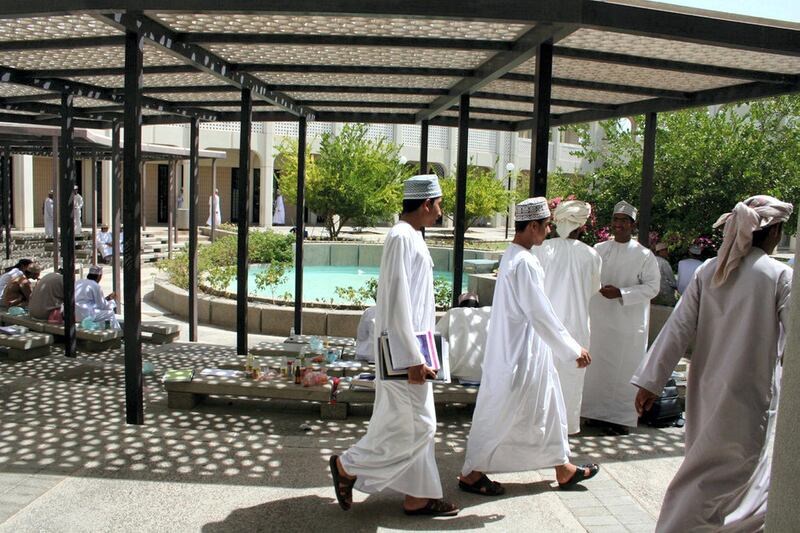Rashid Al Saadi could not stop smiling after swallowing "headache" medication offered to him by a university classmate in the northern Omani city of Sohar.
The next day, he told his older brother, Tarik, the pill he took was “like no other pill in the world”. It was not until later that they found out the drug was illegal.
Two days later, the 22-year-old, who is studying business management, was asked by the same classmate if he wanted another “headache" pill — but this time he had to hand over 3.5 rials (Dh33).
"I found out it was a drug called Yaba after I alerted the police and handed over a sample to them," Tarik, 27, told The National.
To avoid prosecution, Rashid's 'friend' cut a deal with the cops, who set up a sting operation with him to catch the suppliers. They were arrested and sentenced to 10 years in jail.
“All I know from the police is that the dealers live in Sohar, and they have a ring that sells to higher education students on campuses in the Al Batnah area. Most are not students themselves but people who live in the same area and make money from selling the stuff to pupils,” Mr Saadi said.
Four suspected dealers, all of whom were not students, were arrested last month in the same university campus in Sohar. The penalty for drug trafficking in Oman is 10 to 15 years in jail, while drug users are given an opportunity to seek treatment.
Drug use in Oman is on the rise. More than 2,850 people were treated in hospital for drug addiction in 2017, compared to about 2,700 in 2016, according to the ministry of health.
Pupils studying the capital, Muscat, say that the use of cocaine, heroin and marijuana is also common among university students.
“The word now in some campuses in Muscat is 'get high in higher education'," said a lecturer, who did not want to be identified, in a Muscat-based university.
The dealers, who appear to be in their late teens to early twenties, mingle with students and deal to them on campus grounds, according to the lecturer.
An Oman university alumnus said dealers “hook” students by giving them free samples at first. Eventually, after developing an addiction, drug peddlers begin charging students, he said.
“I was hooked that way. Two of them asked me to snort white powder, which they placed on the back of my hand when they came to my university’s cafeteria. I thought it was cool. I did it a couple of times. Then they demanded money," said Sabri Al Ismaili.
The 26-year-old was snorting powdered MDMA that was being sold to him in dosages packaged in small plastic bags for 25 rials (Dh245) a piece.
"My father noticed something strange about me and called the police. They took a blood sample and said I was positive for drugs. I got rehabilitated for two months after being hooked on drugs for over a year,” said Mr Al Ismaili.
_____________
Read more
GCC countries collaborate to seize drugs from smugglers
Man held over drug-related murder in east Oman
_____________
Mr Ismaili is among the lucky ones. After his rehabilitation in 2014, he went back to the university to graduate and then hired by a bank in Muscat. But others never recover from the addiction.
In October 2017, a university student in Muscat was rushed to hospital and died shortly afterwards from an overdose.
“He missed the morning class and in the afternoon we found him still in bed but could not wake him up. We knew he was taking drugs and we also know people from outside the campus were selling him the drugs. It is sad that he ended up that way,” one of his classmates, who did not want to be named, told The National.
In September last year, Oman launched a month-long campaign headed by the state-run National Committee for Narcotics and Psychotropic Substances targeting schools and universities, where they held talks with pupils about the side-effects of drug dependency.
“The campaign needs time to work. People should not jump to conclusion too soon. But I think we need statistics to know how many students are addicted, their age group and which areas of Oman,” said Harith Al Harthy, a volunteer at the Hayatt Association, a charity organisation dealing with drug addiction.
Mr Al Harthy has called for data collection and more investigation to better understand the scale of Oman's student drug problem.
He also called for more drug rehabilitation centres, saying that there are not enough in the country.
Earlier last year, the government said it will invest more than $200 million in the next five years to double the number of beds in the country's only rehabilitation centre and build more facilities.
Al Masarra Hospital is the only medical institution in the country that offers rehabilitation for drug addiction. When the hospital opened in Muscat in 2014, the drug rehab centre had just 50 beds. A year later, it doubled its capacity.





